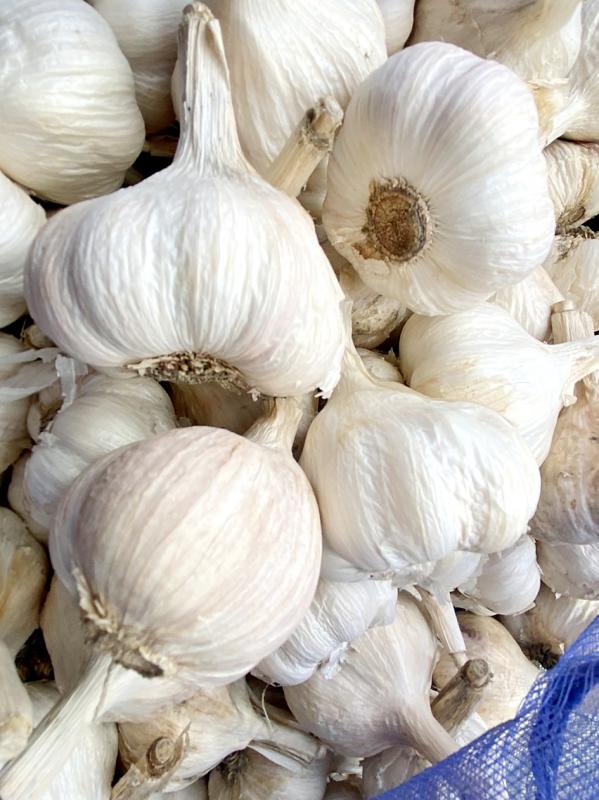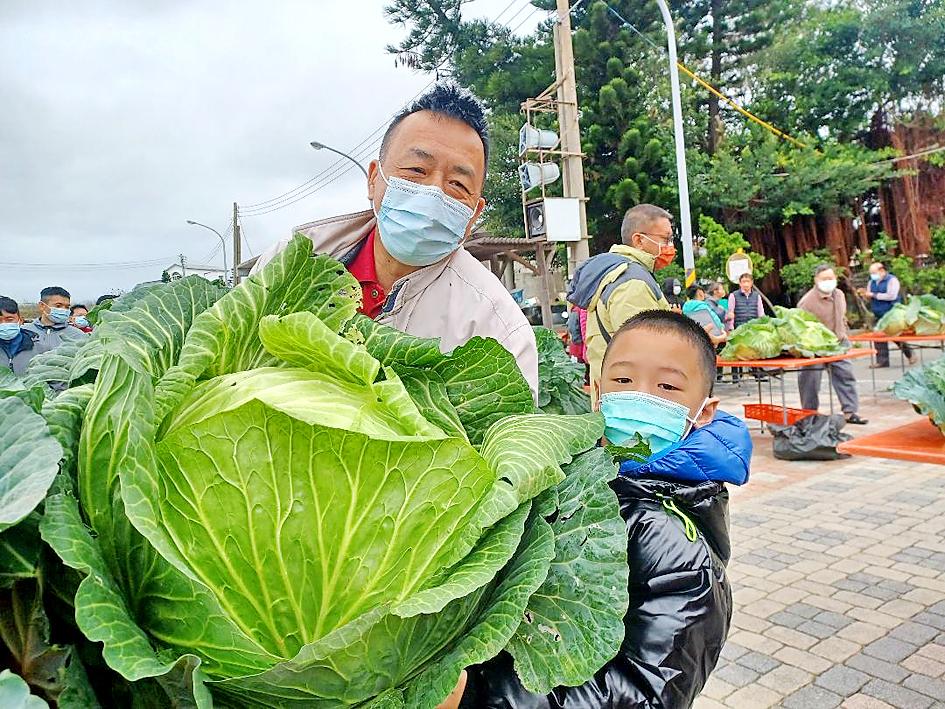The nation’s favorite vegetables are Taiwanese cabbage, yam leaves and bok choy, while raw garlic is the least popular, a poll showed.
Results of the “Stars of Taiwanese dishes and cooking” online poll was released in Taipei on Wednesday. The survey, which collected opinions on the six major food categories, was organized by the Taiwan Millennium Health Foundation, the Health Promotion Administration (HPA) and the Council of Agriculture.
Taiwan’s most popular fruits were bananas, dragon fruit and Asian pear; while tofu, salmon and eggs topped the list in the “Meat, Fish, Eggs and Legumes” category.

Photo: Chan Shih-hung, Taipei Times
White rice, noodles and multi-grain rice topped the “Cereals and Whole Grains” category, while the “Dairy Products” category was led by milk, followed by yogurt drinks and yogurt.
The favorites in the “Nuts” category were walnut, pine nut and pistachio.
Garlic was the least favorite in the “Vegetables” group, followed by brown-cap white mushrooms (Hypsizygus marmoreus) and Okinawa spinach, while Durian was the least popular fruit.

Photo: Liu Yu-ching, Liberty Times
Fried dough sticks (youtiao, 油條), mock ham, evaporated milk and flaxseed were the least favorite foods in the “Cereals and Whole Grains,” “Meat, Fish, Eggs and Legumes,” “Dairy Products,” and “Nuts” categories respectively.
The survey collected responses from 172,000 people. Respondents in the 30-to-39 age bracket made up the largest group, accounting for 34.2 percent of all respondents, followed by the 40-to-49 age bracket.
Pan Wen-han (潘文涵), a researcher at Academia Sinica’s Institute of Biomedical Sciences, said garlic was the least popular vegetable because Taiwanese do not like eating it raw, as it is usually sliced and sauteed to lend its aromatic flavor to Taiwanese dishes.
Most Taiwanese still prefer eating white rice and noodles, but they should consume more whole rice and multigrains, which can protect from cardiovascular disease, Pan said.
Pan said people should limit consumption of deep-sea fish to twice a week, due to possible high heavy metal content, which could affect coagulation and other blood functions.
People should check the glycemic index of fruits, Pan said, adding that, for example, banana is among the favorites in the poll, but elderly or diabetic people should for not eat too much of the fruit in one sitting.
“Studies in other countries have shown that vitamin D deficiency could increase the risk of COVID-19 infection by 77 percent, which is likely due to enhanced immunity gained from vitamin D and of its function to diminish inflammation in the body,” she said. “Drying mushrooms under the sun can boost their vitamin D levels. So people can boost vitamin D intake by eating more sun-dried mushrooms and fungus.”
Taiwan Millennium Health Foundation chairman Hsu Huei-heng (許惠恒), an expert in diabetes treatment, said the poll provides opportunities for public nutrition awareness, for example by introducing people to the six major food groups, and presenting charts and graphics to educate the public on daily recommended allowances.
Poll results, alongside data from the HPA, could help people create daily meal plans, for example two portions of dairy products, three portions of vegetables and two portions of fruit, and more whole grains to remain healthy and protect against metabolic syndromes, Hsu said.
HPA Director Wu Chao-chun (吳昭軍) said people should consume a variety of food products to maintain proper nutrient intake, which is necessary for a healthy body, as the nation faces a surge in COVID-19 infections.
Additional reporting by Jason Pan

Actor Darren Wang (王大陸) was questioned by prosecutors for allegedly orchestrating an attack on a taxi driver after he was allegedly driven on a longer than necessary route in a car he disliked. The questioning at the New Taipei City District Prosecutors’ Office was ongoing as of press time last night. Police have recommended charges of attempted murder. The legally embattled actor — known for his role in the coming-of-age film Our Times (我的少女時代) — is under a separate investigation for allegedly using fake medical documents to evade mandatory military service. According to local media reports, police said Wang earlier last year ordered a

CAUTION: Based on intelligence from the nation’s security agencies, MOFA has cautioned Taiwanese travelers about heightened safety risks in China-friendly countries The Ministry of Foreign Affairs (MOFA) yesterday urged Taiwanese to be aware of their safety when traveling abroad, especially in countries that are friendly to China. China in June last year issued 22 guidelines that allow its courts to try in absentia and sentence to death so-called “diehard” Taiwanese independence activists, even though Chinese courts have no jurisdiction in Taiwan. Late last month, a senior Chinese official gave closed-door instructions to state security units to implement the guidelines in countries friendly to China, a government memo and a senior Taiwan security official said, based on information gathered by Taiwan’s intelligence agency. The

Taiwan Semiconductor Manufacturing Co (TSMC), the world’s largest contract chipmaker, said yesterday that it is looking to hire 8,000 people this year, at a time when the tech giant is expanding production capacity to maintain its lead over competitors. To attract talent, TSMC would launch a large-scale recruitment campaign on campuses across Taiwan, where a newly recruited engineer with a master’s degree could expect to receive an average salary of NT$2.2 million (US$60,912), which is much higher than the 2023 national average of NT$709,000 for those in the same category, according to government statistics. TSMC, which accounted for more than 60 percent

President William Lai (賴清德) should protect Taiwan Semiconductor Manufacturing Co (TSMC), and stop supporting domestic strife and discord, former president Ma Ying-jeou (馬英九) wrote on Facebook yesterday. US President Donald Trump and TSMC on Monday jointly announced that the company would invest an additional US$100 billion over the next few years to expand its semiconductor manufacturing operations in the US. The TSMC plans have promoted concern in Taiwan that it would effectively lead to the chipmaking giant becoming Americanized. The Lai administration lacks tangible policies to address concerns that Taiwan might follow in Ukraine’s footsteps, Ma wrote. Instead, it seems to think it could